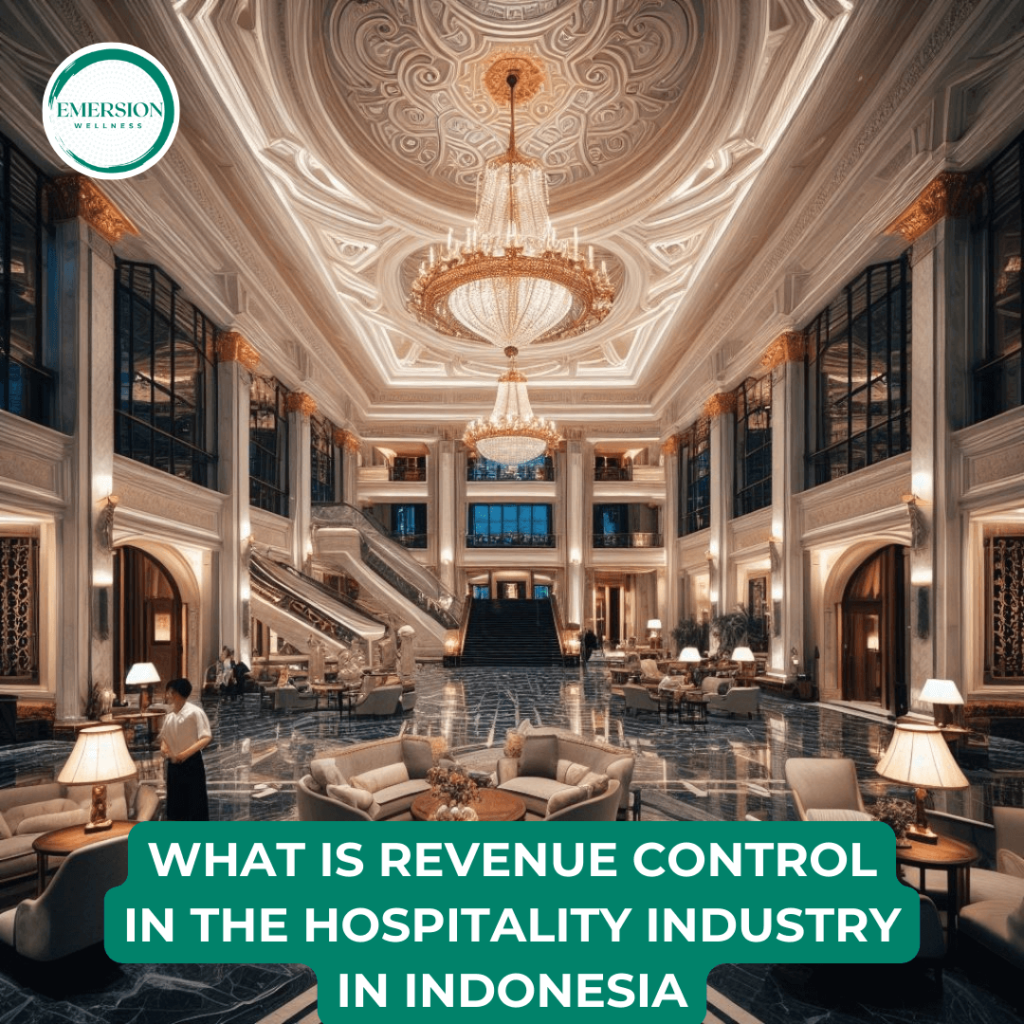Revenue control is a crucial aspect of any hotel's financial success. It involves strategically managing room inventory and rates to maximize revenue. This article will provide an in-depth look at what revenue control entails in the hospitality industry, with a specific focus on how it is applied in Indonesia.
Key Takeaways
- Revenue control is focused on strategically managing room availability to maximize revenues.
- Tactics involve closing availability for discounts, overbooking, setting LOS rules, allocating rooms to channels, and more.
- Revenue control is critical for Indonesia's seasonal market with high OTA use and short booking windows.
- Automated RM systems allow dynamic control aligned to changing demand patterns.
- When implemented effectively, Indonesian hotels see substantial gains in room rates, occupancy, and overall revenues.
Understanding Hotel Revenue Management
Revenue management refers to the strategies and tactics hotels use to optimize income by selling room nights profitably. The goal is to sell each room at the highest possible rate to the right customer at the right time.
Effective revenue management focuses on understanding demand patterns and customer behaviors. By analyzing trends, hotels can forecast demand to optimize pricing and availability for different market segments.
Key Elements of Hotel Revenue Management
There are several core elements to revenue management:
- Demand forecasting - Analyzing data like historical bookings, local events, and competitions to predict consumer demand.
- Segmenting markets- Dividing customers into different groups based on needs and price sensitivity.
- Inventory control - Managing room availability across distribution channels.
- Pricing strategies - Setting variable room rates in line with demand forecasts.
- Channel management - Distributing inventory across booking channels to reach target markets.
- Performance analysis - Monitoring results to inform future strategies.
When these elements work together, hotels can increase revenue by providing the right rooms to the right customers at the right prices.
The Role of Revenue Control
Revenue control sits within the broader revenue management approach. It refers specifically to controlling room inventory and availability to drive higher revenues. Revenue controllers analyze demand patterns and customer booking behaviors. They use this data to open and close specific room types for sale across different channels.
By limiting room availability strategically, hotels can:
- Increase rates for rooms in high-demand
- Offer discounts to stimulate bookings for low-demand dates/rooms
- Protect room inventory for customers willing to pay higher rates
- Manage length of stay to avoid discounted long stays
- Limit sales on low-rated distribution channels
This availability control allows hotels to maximize revenue by securing the most profitable bookings.
Why Revenue Control Matters in Indonesia?
Revenue control is especially critical for hotels in Indonesia for a few key reasons:
1. Managing High Seasonality
Indonesia experiences extreme seasonality in occupancy and rates across different regions. Certain destinations like Bali can shift from 100% occupancy in peak season to 40% in low season.
Strategic revenue control allows hotels to capitalize on peak demand while remaining profitable in slower periods. Tactics like minimum stay requirements, overbooking, and rate fences can help secure revenues year-round.

2. Balancing Discounted Channels
Many Indonesian hotels rely heavily on low-rated online travel agencies (OTAs) and resellers. While these channels provide volume, overdependence limits profitability.
Revenue controllers help balance discounted sales by closing out high-demand dates/rooms on OTAs. This pushes bookings towards higher-rated channels like direct and corporate bookings.
3. Responding to Local Events
From regional holidays to concerts and conferences, local events drive booking surges. Revenue control lets hotels respond quickly by closing out discounted rates and holding availability for peak pricing. With constant monitoring, controllers can open and close availability dynamically based on real-time demand shifts.
4. Maximizing Short Lead Times
Indonesia sees a high share of last-minute bookings compared to other regions. With many bookings made just 0-3 days before arrival, availability control is essential for responding to late demand surges.
By keeping options open closer to arrival dates, controllers allow properties to optimize pricing as short lead-time demand materializes.
Key Revenue Control Strategies for Indonesia
Here are some of the top revenue control tactics used specifically for the Indonesian hospitality market:
Dynamic Discounting
Closing out discount rates strategically around peak demand allows hotels to steer bookings towards higher-rated business.
Controllers may open discounted rooms on weekdays or off-season weeks when demand is slower. For weekends or high seasons, discounts can be closed off to push bookings to premium rates.
Length of Stay Controls
Minimum and maximum stay restrictions can maximize revenues from longer bookings. Controllers may set 3-night minimums on weekends or peak seasons to increase revenue per booking. Maximum stays of 5 or 7 nights can also prevent long discounted bookings from occupying high-demand rooms.
Group and Negotiated Rates
Availability for discounted group or corporate rates is managed closely by controllers. This inventory is closed first when demand surges to control access to lower rates during peak periods.
Overbooking
Hotels overbook based on historical no-show rates to protect against empty rooms. Controllers fine-tune overbooking limits for different room types and seasons to maximize occupancy without risking walk-aways.
Allocation to Distribution Channels
Controlling room allocations for OTAs prevents over-reliance on discounted sales. Closing out high-demand dates pushes bookings towards higher-rated channels.
Forecasting and Monitoring
By reviewing historical patterns and real-time data, controllers forecast demand surges from source markets, events, and seasons. Availability is adjusted dynamically in response to changes.

Revenue Control Systems
To implement effective revenue control, hotels need centralized systems that provide:
- Demand forecasting - Analyze historical data to predict future demand per market segment.
- Inventory management - Track rooms inventory, allocate to sales channels, open/close availability.
- Pricing management - Adjust room rates based on demand, competition, booking pace, and other analytics.
- Reporting - Monitor key metrics to identify problems and opportunities.
Modern revenue management systems integrate with reservation platforms to provide automated, real-time revenue control. Rules can be set to automatically close discounts, set LOS restrictions, or overbook based on demand algorithms.
With automated systems, revenue controllers gain insights and tools to update availability and rates dynamically in line with market conditions.
Implementing Revenue Control Strategies
Here are some tips for hotels to start optimizing revenue through improved control:
Get Buy-In Across Departments
Revenue control impacts front office, sales, marketing, and executive teams. Cross-department collaboration ensures new strategies align with operational realities and business goals.
Invest in Data Analytics
The data exists in PMS and other systems. Hotels should invest in commercial or custom analytics to get actionable insights from this data.
Build a Revenue Control Culture
Have dedicated revenue controllers or train wider teams on core principles. Integrate revenue control metrics into incentive programs.
Balance Customer Experience
While controlling availability, ensure overbooking, stay limits, and other tactics don't negatively impact guest satisfaction long-term.
Review Systems Capabilities
Assess your current PMS, CRS, and channel manager to ensure required automation and integration capabilities are available. If not, there are many modern cloud-based RM systems available.

Monitor Early Results
Review reports frequently when launching new initiatives to identify positive and negative impacts. Refine strategies based on data insights.
The Benefits of Revenue Control
With the right people, processes, and technology in place, revenue control delivers significant financial returns for hotels. The benefits include:
- Increased room rates and RevPAR performance
- Higher revenues during peak demand periods
- Protection of availability for most profitable bookings
- Improved channel mix and reduced OTA dependency
- Balanced occupancy across high and low seasons
- Maximized revenues for special events and promotions
- Minimized rate disparity and brand consistency
In competitive markets like Indonesia, small revenue gains per booking add up to drive big gains in annual hotel profitability. By mastering availability and inventory control, Indonesian hotels can offset seasonal declines and capture more high-rated bookings year-round. With the right revenue control strategy, substantial gains in profitability and market share are possible.
Conclusion
As competition grows across Indonesia's hospitality sector, small revenue gains from each booking become even more vital. Revenue control provides an effective strategy for hotels to capture more high-rated bookings and maximize revenues through intelligent inventory and availability management.
However, this is an ongoing optimization process. Having the right people, processes, data, and technology in place allows hotels to continually adapt availability based on evolving market dynamics. Hotels must strike the right balance between revenue maximization and customer experience.
Emersion's Wellness can provide the expertise and solutions needed to build a successful revenue control strategy tailored specifically for your Indonesian hotel. From revenue management systems implementation to training and ongoing optimization support, our team has the local market experience to help you drive higher revenues and profits.
Contact Emersion Wellness today to discuss how improved revenue control can help your hotel capture more high-rated bookings and maximize revenues year-round.
Frequently Asked Questions
Here are some common questions hotels have about implementing revenue control strategies:
What data should hotels analyze for revenue control?
Focus on booking pace data, historical pickup reports, seasonality patterns, lengths of stay, lead time trends, cancellation history, and segmentation reports (channel, source market, etc).
How often should revenue controllers adjust availability?
Availability can be adjusted daily or weekly for reservations 2-6 months out. As the arrival date approaches, more frequent adjustments may be needed based on pickup.
When should discounts be closed out?
Discounts can be closed first for expected high-demand periods based on historical data. Closing out can then be done dynamically based on actual booking pace data.
How does overbooking impact customer experience?
Overbooking above 105% tends to increase walk-aways. Monitor no-show history by market segment to overbook just enough without excessive displacement.
What modern revenue tech is available?
Many options exist like IDeaS, Duetto, Cloudbeds, Atomize, Xotelia, etc. Cloud systems provide automation, analytics, and mobile access.
How can revenue control help during low seasons?
Restrict discounts to just off-peak dates using dynamic control. Set minimum LOS rules to drive revenues during shoulder seasons.
Should revenue control differ by market segment?
Yes, apply custom control tactics for wholesale, corporate, OTA, leisure, and other segments based on value to the hotel.
How quickly does revenue control impact profits?
Enhanced availability control combined with pricing and segmentation starts driving higher RevPAR within 1-2 months typically.
What risks does over-controlling pose?
Limiting too much inventory can lead to empty rooms that could have been sold. Overbooking without monitoring no-show data can also backfire.
How does rate parity impact revenue control?
Revenue control works best with flexible rates. Rate parity limits can restrict how much hotels can differentiate pricing across channels.
For more information contact us
Check out our other useful articles on our Blog page.

I'm Nathan Baws, a nutrition nerd, exercise and weight loss expert, and an unwavering advocate for good health. As the founder of Emersion Wellness, I'm passionate about crafting Seamless Weight Loss Programs to supercharge hotel revenue and transform lives. We've pioneered the World's First Plug & Play Weight Loss Programs for top hotels and resorts, sparking a wellness revolution. Beyond my professional journey, you'll often find me hiking, swimming, and riding the waves, embracing every moment in nature. Join me on this exhilarating journey towards diet, health and wellness.

